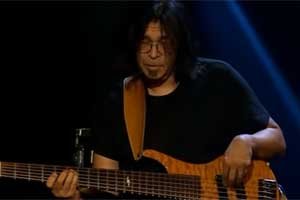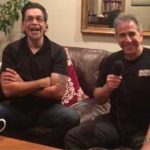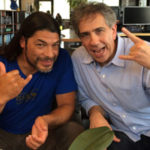Consummate session bassist talks about his experiences with the Yellowjackets, Jeff Lorber, Robben Ford and Allan Holdsworth
Exclusive interview with FBPO’s Jon Liebman
September 6, 2010
New York native Jimmy Haslip began playing the bass as a teenager, mostly self-taught. Perhaps best known as a founding member and bass player of the Yellowjackets, Jimmy has also performed, recorded and/or toured with an extremely long and diverse list of musicians that reads like a who’s who of 20th and 21st century culture. That list includes: Gino Vanelli, David Sanborn, Rod Stewart, Joe Cocker, Chaka Khan, Al Jarreau, John Scofield, Crosby, Stills & Nash, Bo Diddley, Kenny Loggins, Larry Carlton, Chubby Checker, Kiss, Charlie Watts, Lee Ritenour, Walter Becker, Randy Crawford, Diane Reeves, Bonnie Raitt, Pat Metheny, Randy Brecker, Bob James, Vinnie Colaiuta, Boney James, Huey Lewis, Toots Thielmanns, The Rippingtons, Bobby McFerrin, Donald Fagen, Bruce Hornsby, Bruce Willis, Patrice Rushen, George Harrison and countless others.
Among the many projects with which Jimmy has been involved during the past year include those for the Make A Wish Foundation, Gino Vanelli, Michael Franks, Marilyn Scott, Everette Harp and Gary Wright.
FBPO: Tell me about your musical upbringing. I understand you were exposed to many types of music while you were growing up.
JH: I grew up on Long Island, about an hour out of NYC, in the 50s and 60s. The music scene on the Island was vibrant. There was live music everywhere with tons of bands and clubs, concert halls and theatres. Bands like the Young Rascals; Vanilla Fudge; The Vagrants (with guitarist Leslie West); The Illusion; The Hassles (with Billy Joel); Uncle Chapin; Dreams; Blood, Sweat & Tears… These where all prominent groups coming out of the Island and NYC. It was a very inspiring environment for a young aspiring musician.
When I was starting to play electric bass as a hobby in 1963-64, having all this living music available to check out was a serious motivation to practice and aspire to become a better musician. Whether or not I would make a career out of music was always a big question mark, but the bottom line was that music was intriguing, joyous and wonderful to experience on many levels.
Growing up, our house was filled with music on a daily routine. My father enjoyed listening to everything from Tito Puente, Mongo Santamaria, Tito Rodriguez, Ray Barreto and Machito to Count Basie, Duke Ellington, Tommy Dorsey, Tony Bennett, Ella Fitzgerald, Errol Garner, Herb Alpert, etc. My Mom loved all that music as well and always listened to the radio. My aunt, who was living with us, loved Johnny Mathis, Jerry Vale, Robert Goulet… My older brother was listening to Stravinsky, Beethoven, Prokofiev, Debussy, Miles Davis, Thelonious Monk, Dave Brubeck, Eric Dolphy, John Coltrane, Bill Evans…
Then I had all the music of my peers – everything from early Elvis to Led Zeppelin, the Beatles, Jimi Hendrix, Cream, Eric Burden & the Animals, The Hollies, The Stones… the list goes on.
Living in the NYC area was a perfect place to be at that time. I got to see many live concerts as a teenager at the Fillmore East, The Academy of Music, Madison Square Garden, the Soho/Greenwich Village club scene, The Action House and colleges all around the area. C.W. Post and Queens College had great concert schedules, too.
So my life as a young amateur musician was filled with a wide variety of music. As a professional musician looking back, I believe I benefited greatly from being exposed to so much music.
FBPO: How did you end up as a bass player? Didn’t you start out playing trumpet and other brass instruments?
JH: I did start out playing trumpet in grade school. In junior high school and high school, I played baritone horn and some tuba in concert band. I was also one of the troop buglers in my Boy Scout troop and played bugle and baritone horn in several drum and bugle corps.
The electric bass became an obsession in 7th and 8th grades. When I was watching a band at a school dance, I became enamored with the sound and vibe of the electric bass. Once my Dad bought me an instrument from a local music shop, I was hooked, even though I had no idea where it would lead me.
I taught myself at first. Not being able to find a left-handed instrument, we got a right-handed instrument and I turned it upside down. It was very comfortable for me at first and it was easy for me to learn songs by ear.
That was it for me. I joined a band with some friends, and that was even more incredible. Playing music in a band took things to another level.
FBPO: Though you’re mostly self-taught, you had a chance to study with Jaco Pastorius for a while. What was that experience like? What did you learn from him?
JH: Before I met Jaco, I had some lessons early on with a bassist on Long Island named Ron Smith and he was responsible for pointing me in a good solid direction. Learning about the diatonic system, studying out of trombone books and organizing basic melodic and arpeggiated patterns. I then studied a lot on my own and with musicians that I was playing with.
I played in a great cover band for over a year and spent a lot of time practicing with the guitarist in the band, Angelo Ficara. I think he studied with Pat Martino. There was also a keyboard player who I spent a lot of time with, named Chris Palmaro. He had studied at Manhattan School of Music. From these relationships, I learned a lot about theory and harmony, including spending time with a great book called the Thesaurus of Scales and Melodic Patterns by Nicolas Slonimsky. It’s a great book, a real eye-opener, as far a harmony is concerned.
By the time I’d met Jaco Pastorius in 1975 in Los Angeles, I already had been doing a lot of work on my own and had been doing a lot of listening and studying progressive music and advanced harmony. Jaco took all of that to yet another level.
Jaco was a genius. I felt extremely fortunate to have met him and studied with him. The short time I spent with him, maybe a dozen one-on-one lessons and workshop-like sessions, was like no other study I had ever done. It was basically a rocketship-like escalation in motivation and understanding. A lot of it is even hard to put into words. It also had a lot to do with being in the presence of someone with an amazing gift. It had an incredible effect on me as a person and a musician.
We talked a lot about harmony and practice skills, things that should be observed for practicing and developing certain skills for picking, all of which opened a big door for my fretless playing later on. We talked about sound and touch on the instrument and singing music, which had become a really big item for me.
Singing things that might have been difficult to play at first was a pathway to understanding it more deeply, eventually making it easier to play. I believe it has to do with connecting with the music on a deeper and more personal plane.
It worked for me in a big way. For that and many other things Jaco taught me, I am forever grateful to him. He made me a better musician on many levels. He will always continue to be my teacher, as his music lives on and is there for all to learn from.
FBPO: The list of your influences covers an incredible array of talents, from Paul McCartney and Jimi Hendrix to Béla Bartók and Dmitri Shostakovich, Thelonious Monk and John Coltrane… even non-musicians like Leonardo Da Vinci and Albert Einstein. How has studying so many great minds made you into what you are?
JH: Well, for me it’s not just about music. I am interested in exploring other art forms and gaining a deeper sense of life in general. I believe that knowledge from all different areas of art opens the door to a vast understanding of who you are and where you want to be in the present.
Studying painting, sculpture, literature, astronomy, science in general, all different kinds of music, film, architecture, dance… anything that rings your bell and/or compels you or downright inspires you is an asset to learning more about life and therefore fills you up with good positive things that will motivate you. I believe knowledge is a key to becoming a better person and balancing your life. Balance will provide a strong foundation for anything you want to accomplish. In my case, a good person who helps people and takes care of his family and is a good musician brings joy into other people’s lives.
FBPO: Tell me about the formation of the Yellowjackets. Is the band still as active as it used to be? Are you still doing a lot of recording and touring?
JH: The Yellowjackets were unofficially formed in 1978 when Robben Ford hired Russell Ferrante, Ricky Lawson and me to play on his debut recording for Electra/Asylum Records, with producer Steve Cropper and engineer/studio owner Bruce Robb at Cherokee Studios in Los Angeles. That was the original band that “officially” became the Yellowjackets in 1981 with the release of the first recording on Warner Bros. Records with producer Tommy Lipuma and engineers Lee Herschberg and Al Schmidt at Amigo and Capitol studios.
Robben Ford had initiated the group and Russell Ferrante, Ricky Lawson and I were to become the founding fathers. Russell and I are still at it and now getting ready to celebrate our 30th birthday of the Yellowjackets in 2011. We have just completed our 21st CD project for a new label, Mack Avenue Records, and are thrilled with the upcoming release in February 2011 and subsequent touring schedule ahead, some of which will include a special guest that plays on the recording.
FBPO: Are you able to disclose who that person is?
We have been touring extensively over the years, especially in the last two years in collaboration with guitarist Mike Stern. We did a collaborative recording, Lifecycle, together in 2008 for the Heads-Up/Concord label and toured heavily for the following couple of years. We are now looking forward to several other collaborative projects that are on the table to follow up our new release in 2011.
FBPO: You’ve performed, recorded and toured with so many musicians throughout your career. You must have a good story about an unusual experience or something you found especially meaningful of memorable.
JH: All I can say to that is that my life has been filled with many incredible experiences and working with so many artists, different musical genres, personalities and traveling all over the world many times over. It’s all been an incredible ride. It’s still going on and I cherish every moment. I feel extremely lucky to have had this in my life and am grateful every day to have this life. It continues as the years melt away and I only hope to continue this stream as long as I possibly can! It’s also about sharing with all the people that I have crossed paths with and I feel blessed to be able to share music and the message that music brings: love, harmony and positive vibration.
FBPO: What’s keeping you busiest these days?
JH: A lot of things! Family, live performances, touring and traveling, studio work, producing recordings, production coordination, writing music, teaching and educational workshops, clinics and residency programs at various schools throughout the year. All these things revolve around the calendar all year long.
I am now in five bands as well: 1) Yellowjackets, 2) Jeff Lorber Fusion, 3) Renegade Creation, with Robben Ford, Michael Landau and Gary Novak, 4) The Allan Holdsworth/Alan Pasqua Group, with Chad Wackerman and 5) The Harvey Mason Group. I also perform with various groups in Los Angeles, like the Jeff Richman Ensemble.
FBPO: You’ve already accomplished so much in your career. What else would you like to do that you haven’t done yet?
JH: Working with more artists as a producer is a focused goal of mine at this point in my career. I enjoy producing very much and have been producing a variety of artists in several different genres of music. My goal is to continue working as a producer and remain active as a composer and performer.
I would also love to take some serious cooking classes, say, in Italy for example. It’s a passion of mine but I am merely a novice in that respect. I love to cook!
FBPO: What else do you like to do that’s not necessarily musically oriented?
JH: I really enjoy film and art and I love seeing as much of both as possible during any free time that I have. I love sports and like going to many different sporting events, college and professional. I enjoy low stress athletics, such as bike riding, bowling, volleyball, softball and swimming. I love scrabble too. I like working out in the gym and I enjoy cooking and entertaining friends and family very much.




